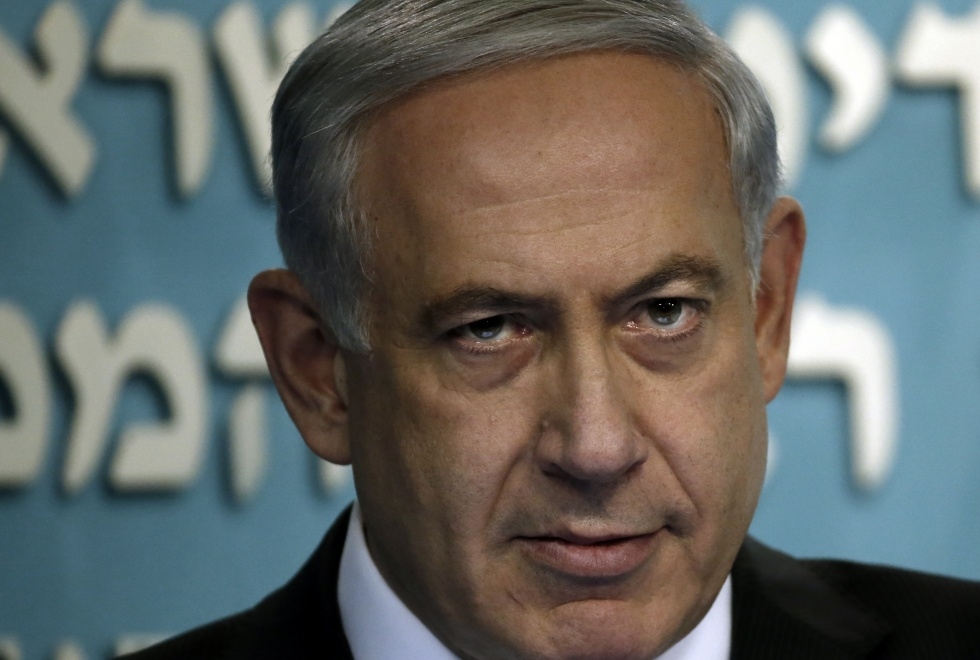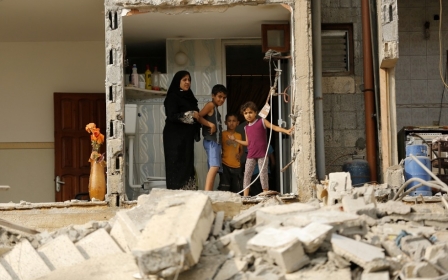Israelis unsure whether they won or lost in Gaza

Despite hailing as a victory the seven weeks of fighting that killed more than 2,100 Palestinians and destroyed large swathes of Gaza’s infrastructure, Israel’s prime minister, Benjamin Netanyahu, appears to have emerged as the main political casualty of Operation Protective Edge.
Among Israeli Jews, polls continue to show strong backing for the army, the most revered of Israel’s national institutions.
Last week, a survey by the Jerusalem Post and Maariv newspapers revealed that 61 per cent of respondents agreed with the statement that the Israeli military – but not Israel – had won in Gaza.
“Israel”, in this case, is clearly understood as a synonym for Netanyahu, whose fortunes have taken a sharp downturn in the aftermath of the military campaign.
In late July, as Israel launched its ground offensive, Netanyahu’s approval ratings stood at 82 per cent. Days before the current ceasefire took effect on 26 August, that figure had slumped to 55 per cent.
Last week, as the ceasefire began, Channel 2 TV found that his popularity had plummeted even further, to 32 per cent. Half the country were reported to be positively dissatisfied with his performance.
No signs of remorse
Israelis’ unhappiness with their prime minister does not indicate, as elsewhere in the world, a backlash against a military campaign that killed more than 500 children, destroyed 20,000 buildings and displaced as many as half a million Palestinians. In Israel there are scant signs of remorse, even from the country’s last remaining self-declared liberals.
Netanyahu and his allies in the cabinet, including defence minister Moshe Yaalon, have been trying to play up Israel’s successes, arguing that the army scored an “impressive victory”. Yaalon noted that Hamas had used up most of its rockets, while Israel had destroyed Hamas’ tunnels, killed key leaders and wrecked its supporting infrastructure.
That assessment has been challenged not only by Palestinians in the occupied territories but by leaders of the Palestinian minority in Israel. At the weekend several Palestinian members of the Israeli parliament attended a victory rally for Hamas near Acre.
One of them, Haneen Zoabi, told Middle East Eye: “This was the longest Israeli attack faced by Palestinians in modern times. It was longer even than the war against Lebanon in 2006. And yet the will of the Palestinian resistance was not broken, and the people of Gaza stood strong. Israel did not achieve any of its political or military aims. When bombarded by one of the strongest armies in the world, that is an undoubted victory.”
Even Netanyahu sounded barely convinced of Israel’s success at a “post-war” press conference. Comparing Hamas to Islamic extremist groups, he observed defensively that even the United States had been unable to defeat al-Qaeda. That refrain was repeated in a rash of interviews with Israeli TV at the weekend.
Herculean task
Few found the comparison persuasive. Settler leader Amiel Ungar noted disparagingly that Hamas’ “Gaza emirate occupies 360 square kilometers and is surrounded on all sides. A week earlier we were told that if the order came down, the IDF could overrun Gaza in seven days. Now a week's work had suddenly mushroomed into a herculean task that would last years.”
Netanyahu’s problem appears to stem from the fact that he has failed to convince his natural constituency on the right that he acted decisively in Gaza. They expected Hamas “smashed”, a term used by many on the right throughout the fighting, or at the very least that Israel would insist on the faction’s “demilitarisation”.
Many Israelis appear particularly incensed by televised scenes of Hamas in Gaza celebrating last week, following the ceasefire announcement. Under its terms, Israel agreed to allow in aid and building materials to ease the humanitarian situation and to extend the fishing zone for Gaza’s fishermen.
Among Israeli Jews, the celebrations in Gaza are widely seen as crowing at the relatively large death toll of Israeli soldiers in the Gaza fighting. Yesterday, it was reported that another soldier had died from wounds sustained in earlier fighting, bringing the total to 66 soldiers and seven civilians.
The high price in blood – even if small in comparison to the suffering of Palestinians in Gaza – placed an added burden on Netanyahu to show he had secured major achievements against Hamas, said Shlomo Bron, a retired general and analyst for the Institute for National Security Studies at Tel Aviv University.
Sacrifice for nothing
“The public is prepared to accept heavy losses if war aims are achieved,” he told Middle East Eye. “But if the sacrifice is seen as for nothing – and that is the view of those who bought into the narrative that Hamas could be destroyed – then Netanyahu is likely to get the blame.”
In addition, the military campaign’s costs to the Israeli economy are already becoming apparent. Yesterday, it was revealed that $560 million cuts were needed immediately, slashing 2 per cent off the budgets of every government department apart from the defence ministry.
To many Israelis, it looks as though the ceasefire has simply restored the status quo, with forthcoming negotiations in Cairo that, it is feared, may win Hamas bigger concessions.
Such concerns were underscored yesterday when an Israeli military source suggested to the Haaretz newspaper that the army’s preferred new approach, designed to prevent renewed confrontation with Hamas, was an easing of the seven-year siege on Gaza. Hamas’ main demand has long been an end to the blockade.
“If we can assist by expanding fishing grounds and easing restrictions on border crossings of people and goods into and from Israel, this will help maintain the quiet,” an unnamed official said.
Rather than making concessions, the Israeli public believes Netanyahu should have pressed on against Hamas. Such sentiments have been voiced by the Israeli prime minister’s rivals in the cabinet, such as Avigdor Lieberman and Naftali Bennett. They have called for the army to “finish the job”.
The Jerusalem Post poll found 58 per cent of Israelis believed the truce was a mistake and that the army should have pushed deeper into Gaza to degrade Hamas military capabilities.
Reflecting that mood, Lieberman’s told Channel 1 TV at the weekend: "The fact that a 20,000-strong terror group has endured for 50 days against the strongest army in the Middle East and has stayed in power – it bothers me very much."
Confidence shaken
Yoav Bar, a leftwing activist and blogger from Haifa, noted that grand but misleading claims made early in the operation had undermined trust in the leadership’s competence. Early, on, he noted, “Israeli military commanders claimed that the resistance is running out of ammunition. By the end of the first week they declared that a third of the missiles were already used. After 51 days of war the only possible conclusion is that they didn’t have any idea how many rockets there were.”
Similar evasiveness over prior intelligence of Hamas’ extensive network of tunnels under Gaza, some of them leading into Israel, also shook Israelis’ confidence. How was it possible that the tunnels became the major justification for continuing the operation only after the ground invasion had begun?
David Horovitz, editor of the Times of Israel, said that, given the army’s near-sacred status in Israel, the blame was most likely to fall on Netanyahu.
The Israeli public, he pointed out, was “psychologically reliant on the assumption that its army can ultimately de-fang all threats, and that if the army fails to do so, that must be because it did not get the correct orders from the political leadership.”
Part of the disquiet, according to Moshe Arens, a former defence minister from Netanyahu’s Likud party, stems from a sense that Netanyahu lacks the political courage to deal with what is seen as a growing threat posed to Israel from Islamic extremism in the region.
That has not been helped by Netanyahu’s repeated efforts to equate Hamas with Islamic State, the jihadist group notorious for beheadings that has recently made major territorial gains across the region.
‘Al-Qaeda on the border’
At the weekend, Netanyahu told Channel 2 he had decided “not to invest all my resources” in Gaza at a time when “the Islamic State is galloping toward us, al-Qaeda is on the Golan borders.”
Arens wrote in the Haaretz newspaper yesterday that Israel’s operation in Gaza “could have been the beginning of a successful campaign against the fanatical Islamic terror spreading its tentacles through the Middle East, threatening not only Israel, but also many Arab countries.”
He and others have noted that the alignment of regional forces in Israel’s favour provided the best strategic environment Netanyahu could have hoped for. “Egypt, Jordan, Saudi Arabia and the Palestinian Authority were eager to see Israel defeat Hamas.”
Netanyahu’s approach to Gaza over the past two months has also risked exposing his own lack of a positive political vision. He appears afraid to destroy Hamas, but equally loath to make any concessions to bolster the position of Mahmoud Abbas.
Isaac Herzog, leader of the opposition Labour party, who had largely supported the operation, argued last week that the military offensive “could have been avoided” if Netanyahu had embraced diplomatic negotiations with Abbas.
Troubling inconsistency
That view may not be a majority one, but, as Horovitz notes, many Israeli Jews sense a troubling ambiguity in their prime minister’s attitude towards Abbas. Netanyahu has implied that Israel’s problems in Gaza could be solved by bringing in Abbas while at the same time also suggesting that the Palestinian leader is not a credible partner in the West Bank.
Bron said he had detected two trends among the Israeli public in the wake of Operation Protective Edge. The first group, Netanyahu’s natural constituency on the right, demanded Israel get even tougher with Hamas and the Palestinians.
The second trend – associated with those in the political centre and the left – believed the main lesson from Gaza was that there is no military solution to Israel’s conflict with the Palestinians and that Netanyahu must revive a diplomatic process.
Netanyahu has increasingly come to be identified with this latter view. At a cabinet meeting just before the ceasefire was agreed, Yaalon, his defence minister, observed: “There are no magic solutions.”
“This situation is full of political difficulties for Netanyahu. If there is no military solution, then he must engage in a diplomatic process. But if he does so, he will be seen as betraying his support base and this group will search for an alternative on the right who they feel better represents them.”
Middle East Eye propose une couverture et une analyse indépendantes et incomparables du Moyen-Orient, de l’Afrique du Nord et d’autres régions du monde. Pour en savoir plus sur la reprise de ce contenu et les frais qui s’appliquent, veuillez remplir ce formulaire [en anglais]. Pour en savoir plus sur MEE, cliquez ici [en anglais].




